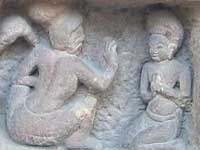Just In
- 1 hr ago

- 2 hrs ago

- 4 hrs ago

- 12 hrs ago

Don't Miss
- Finance
 How Will Bitcoin Halving 2024 Impact Bitcoin?
How Will Bitcoin Halving 2024 Impact Bitcoin? - News
 H5N1 Bird Flu Detected In Raw Cow Milk At High Levels, WHO Issues Warning
H5N1 Bird Flu Detected In Raw Cow Milk At High Levels, WHO Issues Warning - Sports
 IPL 2024: Robin Uthappa On What Could Be The Only Factor Stopping MS Dhoni From Playing Beyond This Season
IPL 2024: Robin Uthappa On What Could Be The Only Factor Stopping MS Dhoni From Playing Beyond This Season - Movies
 Metro In Dino: When Ananya Panday Warns Sara Ali Khan Not To Touch Aditya Roy Kapur As She Pairs Up With Him
Metro In Dino: When Ananya Panday Warns Sara Ali Khan Not To Touch Aditya Roy Kapur As She Pairs Up With Him - Technology
 Garena Free Fire Max Redeem Codes for April 20, 2024: Get Access to the Latest In-game Loot
Garena Free Fire Max Redeem Codes for April 20, 2024: Get Access to the Latest In-game Loot - Automobiles
 Ford Mustang 60th Anniversary Package – Limited To Just 1,965 Units
Ford Mustang 60th Anniversary Package – Limited To Just 1,965 Units - Education
 Exam Pressure Does Not Exist; Studying Punctually is Crucial; Says Aditi, the PSEB 2024 Topper
Exam Pressure Does Not Exist; Studying Punctually is Crucial; Says Aditi, the PSEB 2024 Topper - Travel
 Journey From Delhi To Ooty: Top Transport Options And Attractions
Journey From Delhi To Ooty: Top Transport Options And Attractions
Guru Gita-Part I

The importance of a guru is extolled in almost all holy scriptures. In the Skanda Purana there is a dialogue between Lord Shiva and Parvati Devi in which Lord Shiva tells her about the guru. This portion known as Guru Gita consists of more than 300 verses. The Guru Stotram that we chant is a part of this. Many other famous verses also come from this text.
The Guru Gita gives a very interesting analysis of various kinds of gurus classified according to the kind of knowledge imparted. A person adept in academic, secular knowledge is called a 'Sucaka guru' where 'sucaka' means one who indicates. This kind of guru equips us with the basics to live successfully in the world. The second kind of guru is the 'Vacaka guru' and he/she gives the knowledge appropriate to one's station in life (as a student, householder etc.). The 'Vacaka guru' teaches right conduct and in this aspect, our parents and elders in society who mould our conduct are also included.
The third kind of guru is the one who initiates an aspirant into sadhana (spiritual practice) through a mantra and thus is called a 'Diksa guru'. Such a person teaches the mantra, its meaning, the method of japa (repetition of a holy name) and rules of utterance and hence becomes also a 'Bodhaka guru' Thus, at every step of a seeker's growth, the guru provides the clarifying knowledge. We shall discuss some of the verses here that define the word "guru" from different standpoints.
Knowledge Standpoint:
The letter 'gu' denotes darkness and the letter 'ru' stands for light. There is no doubt that the guru is verily the 'Brahman', the swallower of (spiritual) ignorance. ( 1:44)
In
the
word
guru,
the
letter
'gu'
stands
for
the
darkness
of
spiritual
ignorance.
The
letter
'ru'
stands
for
the
light
of
knowledge
that
removes
that
darkness.
So
guru
means
one
who
dispels
the
darkness
of
ignorance.
Only
'Brahmajnana'
(Knowledge
of
the
Self)
is
capable
of
dispelling
spiritual
ignorance;
once
illumined
by
that
special
knowledge,
'Brahmajnana'
and
Brahman
(The
Supreme
Self)
are
realized
to
be
not
different
from
each
other.
Therefore
guru
is
none
other
than
Brahman,
the
very
light
of
lights.
As the student evolves, the guru takes on a more intense role and finally becomes the very light of knowledge that burns out the thick cover of darkness. The syllables of 'gu' and 'ru' then shine forth as a beacon of that supreme knowledge.
To be continued
-
 pulseHow To Excel In Your Group Discussions?
pulseHow To Excel In Your Group Discussions? -
 festivalsVijayadasami - Spiritual Significance
festivalsVijayadasami - Spiritual Significance -
 ramana maharshiFree Will And Divine Will
ramana maharshiFree Will And Divine Will -
 shirdi sai babaShri Sai Satcharitra-Chapter 39-Part IV
shirdi sai babaShri Sai Satcharitra-Chapter 39-Part IV -
 ramana maharshiWho Are You, Friend?-Part I
ramana maharshiWho Are You, Friend?-Part I -
 ramana maharshiAs It Is
ramana maharshiAs It Is -
 ramana maharshiWhat Each Seeker Owes To Ramana Maharshi
ramana maharshiWhat Each Seeker Owes To Ramana Maharshi -
 thoughtService And Self Knowledge-How Does Work Become Service?
thoughtService And Self Knowledge-How Does Work Become Service? -
 thoughtService And Self Knowledge
thoughtService And Self Knowledge -
 thoughtThe Eloquent Silence
thoughtThe Eloquent Silence -
 ramana maharshiSri Ramana Maharshi : The Testimony to Spiritual Truth
ramana maharshiSri Ramana Maharshi : The Testimony to Spiritual Truth -
 ramana maharshiThe Mad Race And Self Knowledge-II
ramana maharshiThe Mad Race And Self Knowledge-II


 Click it and Unblock the Notifications
Click it and Unblock the Notifications



